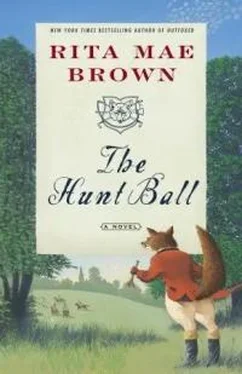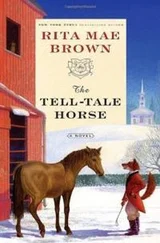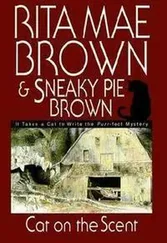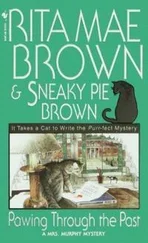“For him, not for her. When Al married Rachel, Amy broke bad. Soured. She never bounced back. Of course, they kept their affair quiet while it was going on. And I don’t know how you feel about this, but I don’t disapprove of relationships between staff or administration. Neither was married. And as I said, they kept it off campus. I don’t know why it ended, only that she was heartbroken and then angry.”
“Angry enough to kill?”
“No. She might have wished him dead, but no.”
“Dead end?”
“So far.” Charlotte passed a tray of lemon curd tarts. “Doesn’t quite go with shepherd’s pie, but it’s all I could scare up from the dining room.”
“I like lemon curd tarts,” Sister said, picking one off the plate. “Are there other affairs of which you know?”
“No,” Charlotte wavered. “Well, none that I’m certain about.”
“Such as.”
“Knute. I think Knute may be sleeping with Bunny. I asked her. We’re friends. She denied it, but she also knows the consequences. He’s married. Something like that could cause harm to the school if it came out.”
“Speaking of coming out—the girls. I assume some of them are sleeping with one another.”
“They are.”
“In the old days they’d have been expelled.”
“Their faculty advisers talk to them. On the one hand, we don’t berate them, on the other hand, we don’t encourage them. But you know, that’s been going on at same-sex schools since the earth was cooling. I pride myself that we’re honest about it. We offer counseling if they ask for it. It’s an age of experimentation. I think, not that I’d say it publicly, that if they don’t at least get crushes on one another, they aren’t developing. It’s part of growing up.”
“Yes, it is. Do you think that might have something to do with Pamela’s behavior?”
“I’ve thought about it. She doesn’t seem to feel affection for anybody.”
“A bad sign.”
“I know.”
“Is it possible Al Perez could have crossed the line with any student?”
“No,” Charlotte forcibly replied. “No. Why he was killed, I don’t know. I can’t come up with a thing. But he didn’t sleep with students. If he had, he’d have been out of here so fast, no one would have seen his dust.”
“I am sorry to come with troublesome news. You’re going through a terrible time. I wish I could do something for you.”
“Being here helps. Knowing I can tell you anything.”
“Tootie did mention something else of interest. She said Pamela was mad at her because she wouldn’t take part in the protest, but she thought Custis Hall should do more, should look into its history. She’s levelheaded, that Tootie.”
“I love that kid. She’s one of those special ones. Valentina is, too, in a completely different way. One is thoughtful, highly intelligent, and reserved. The other one is charismatic, bright, and high-spirited.”
“They are beguiling, as is Felicity, quiet and steady.”
“So you know, I appointed Tootie and Pamela as well as Valentina to search for a person who can evaluate the artifacts. They also have to find someone who can counsel us on the period in which Custis Hall was built, and lastly, they need to come up with research and writing projects for students. I’ve put them to work and I’m hoping by making them work together some of their hostilities will abate. Each of them is capable, it’s the emotional component, but then it always is, isn’t it, regardless of age?”
“In theory we get better at working with people who go about a task differently than we do.”
“In theory.”
“Still, it’s hard to work with people we plain don’t like.”
C H A P T E R 1 2
Tradition binds us to the dead for good or for ill. Hunting defines human cooperation. It was probably the first large-scale enterprise we undertook as a species. Language and technology started with the chase. Architecture developed later, agriculture is even more recent in the lurching progress of Homo sapiens, agriculture being perhaps fourteen thousand years old.
Drawings on Egyptian tombs show hounds walking out on long couple straps prior to being released to chase, by sight, their quarry. Homer mentions hunting with hounds in The Odyssey. Asian and European civilizations hunted, but it took the English to raise hunting to an art.
Then as now, the money flowed to those who could handle hounds, horses. Blacksmiths, saddlers, bootmakers, tailors, purveyors of foodstuffs for humans, horses, hounds, real estate agents all benefited from hunting. Herdsmen did, too, as hunts removed their fallen stock, saving the farmer or shepherd a great deal of effort.
Originally hunting foxes fell into the lower class of venery. Stag hunting, boar hunting had pride of place. By the end of the seventeenth century, at the dawn of the great eighteenth century, foxhunting took over. The venue for those seeking to make a place for themselves in politics, in society, now rested with a cunning foe, the fox.
The Enclosure Laws ensured that the fields of England, for the most part, were divided into lovely squares bound by hedges, fences, or double ditches. The rest of Europe kept to the old village-and-commons system, which is apparent if one flies low over France. But England went her separate way just as she went her separate way over religion during the reign of Henry VIII. Both divergences ensured a nation of freethinkers or, as a foxhunter would say, people who take their own line.
Chasing that red devil meant one would soar over wooden fences, oxers—a type of double jump—bullfinch (nasty) hedges, the odd gate, stone walls, deep ditches, and whatever else the farmer had constructed to keep his stock where it belonged.
The English also believed in giving the quarry a sporting chance. Americans refined this even further, in part because their lands were and remain much wilder. Also, cattle not sheep are the dominant animal in American pastures. The fox isn’t a pest in America unless you keep poultry. There is no need to kill foxes. The English farmer is within his rights to kill them as they destroy his newborn lambs just as a Wyoming sheep farmer is within his rights to shoot a coyote.
The traditions for the United Kingdom, the United States, Canada, Australia, in fact, wherever English is the language, remain unchanged. If a fox is viewed, hounds not yet on the line, the huntsman, ideally, should count to twenty before swinging hounds that way. Give the fox a fair chance to get moving. No hole, drain, or culvert can be stopped. The fox has every opportunity to pop down whatever underground chamber appeals to him. This has been the case in America but has only recently been put into practice in England.
The other tradition is that hounds have the right-of-way. There is no exception to this. A horse who kicks a hound must leave the field.
In counties where hunting is prevalent, those driving a car automatically slow. People should anyway as a matter of course, but those who don’t, if recognized, soon find themselves verbally accosted or in the social deep freeze. Hounds always have the right-of-way.
Never speak to a hound. Even if you were present at its birth, even if you walk out the pack daily, never speak to a hound. Only the huntsman and whippers-in may speak to the animal. Too many voices can confuse the hound and, worse, your big flannel mouth may cause the animal to lift its head.
The sound of “Hike to him,” “Hark,” or “Leave it” from a member of the field has caused huntsmen to just go off, a torrent of abuse following. Other, more diplomatic huntsmen, if hearing the sin, call the hound to them as quickly as possible. But the tradition is as it was in the time of the pharaohs: Never speak to a hound when hunting.
Читать дальше












